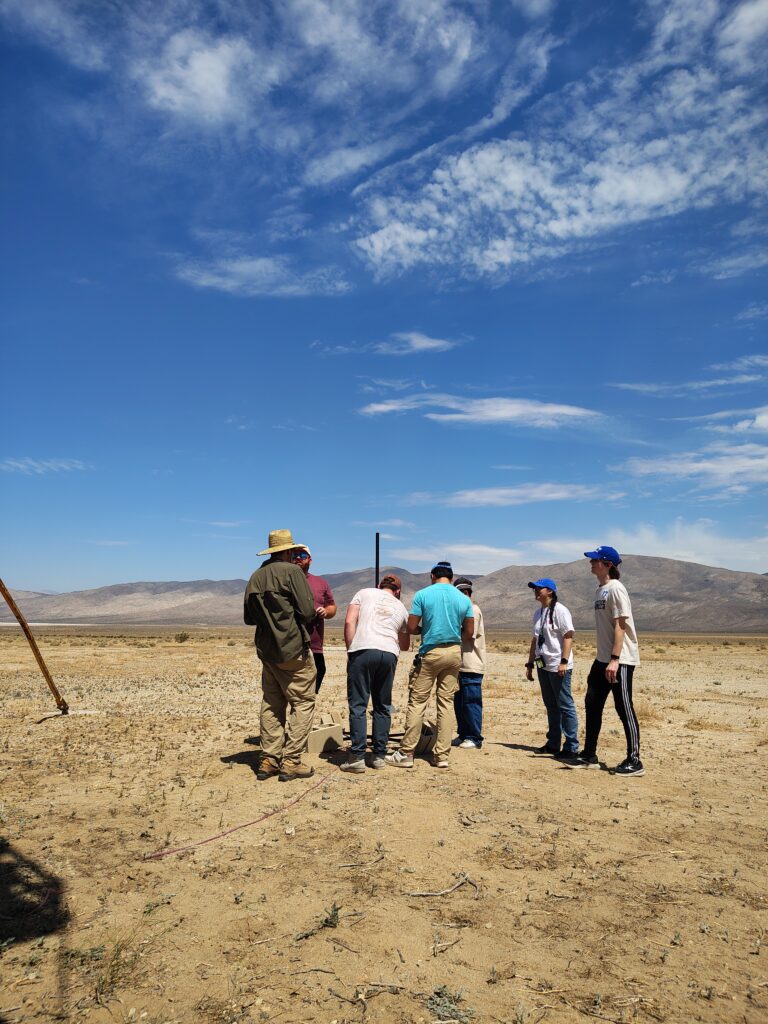The RRS held a launch and firing event at our private Mojave Test Area (MTA) on Saturday, June 14, 2025. I was the pyro-op in charge for the event entirely consisting of member projects. Members Jim Gross, Derek Madrid, and RRS treasurer, Joel Cool-Panama were also present to observe and support operations with me. Each of the three projects that day was a liquids class project.
Weather was decent for June. Peak temperatures reached 102F in the Dosa Bldg. Winds were very low all morning.
Austin Sennott and Charles Sharp, both new members of the RRS, brought an extended body version of the Mojave Sphinx. This single-tank, autogeneous pressurized nitrous-oxide/E85 alcohol had added propellant volume but much the same systems as described in the Half-Cat manual. The payload was a dual-deployment recovery system and telemetry package. They have had many prior flights (well over a dozen) with prior versions but this was their first flight from the RRS MTA.
Assembly, loading the rocket onto the 1515 rail launcher and system checkout all went well. Propellant load and nitrous fill operations leading to launch all went smoothly.
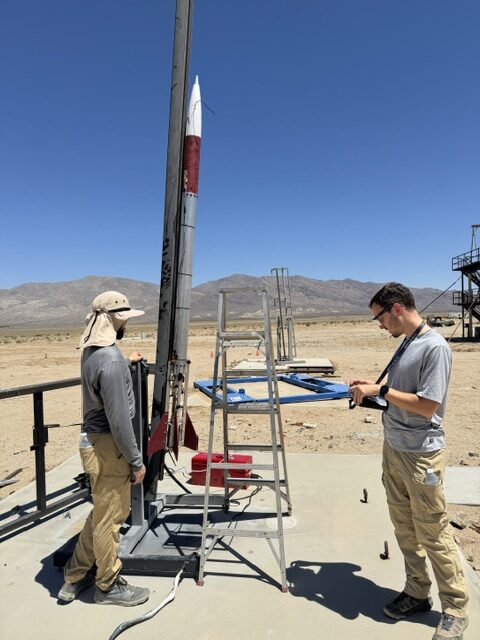
Launch from the 1515 rail slot was clean and swift. The rocket reached an altitude of 9,066 feet according to their telemetry. The drogue chute failed to deploy fully leading to a hard landing a mile west and slightly south of the MTA. The vehicle was fully recovered and brought back for review. Most notable about this operation was Austin and Charles were one of the few teams to ever launch their rocket before 12 noon on a firing day. They set a good example for safe and efficient operations.
The second member project by Walter Lohmueller and his colleague Jacob Metcalf was a static firing of a similar liquid bi-propellant system to the Mojave Sphinx. They used nitrous-oxide and isopropyl alcohol (IPA) for propellants. They had multiple engines and ran four tests.
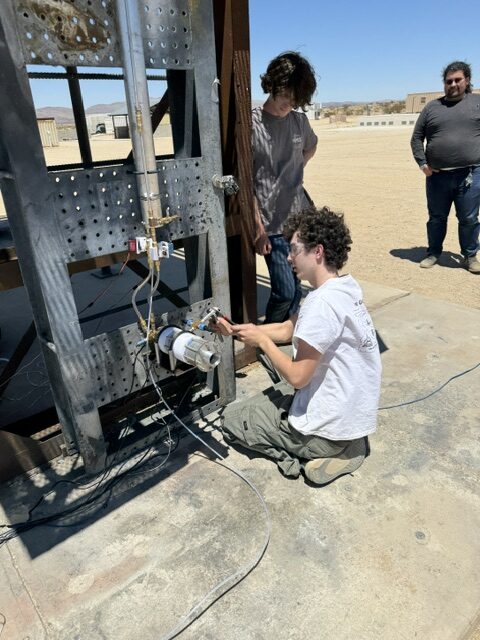
Loading, countdown and static firing operations went well. The first test shattered the graphite nozzle of that engine. The second engine used was fired twice first with ignition problems and next with some noticeable chugging problems. The fourth and last test of the day was a hard start that shattered the engine. The small propellant quantities used in testing limited the resulting fire which was easily contained.
Walter and Jacob removed their setup and will investigate further. Leading theory is fuel pooling and poor mixing. Liquid rocket chamber ignition sequence is very important to having success. The modular design of the engine allows for improvement and it has had many prior successes.
The third project that day was a small gaseous hydrogen and gaseous oxygen spark-plug fired (GH2/GO2) torch igniter built by Zach Lesan.
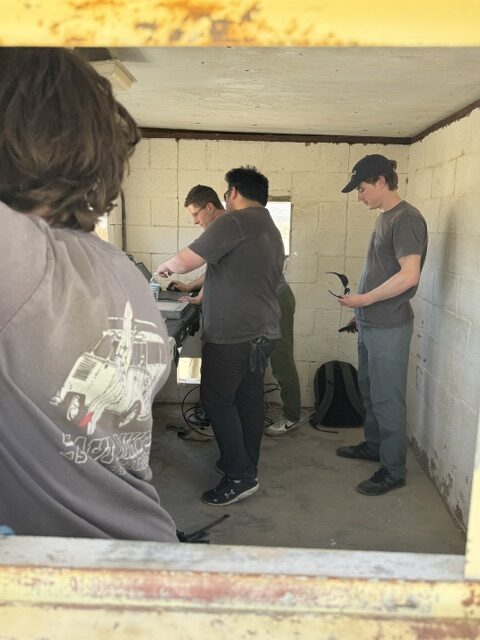
This tiny igniter is the first element in a much larger project to build a gas-generator cycle turbopump-fed bi-propellant engine. Based from a NASA design, his experimental blowdown rig provided enough flow for a series of firings. After correcting an electrical switch problem, he was able to achieve a limited number of firings proving (at least by sound) that the igniter lit the mixture repeatedly. He’ll have a fuller report of the results later.

The RRS is seeing a lot more liquids activity and we’re glad to support experimental work, launch and static firings. I was glad to have the support of other members assisting in the event building experience.
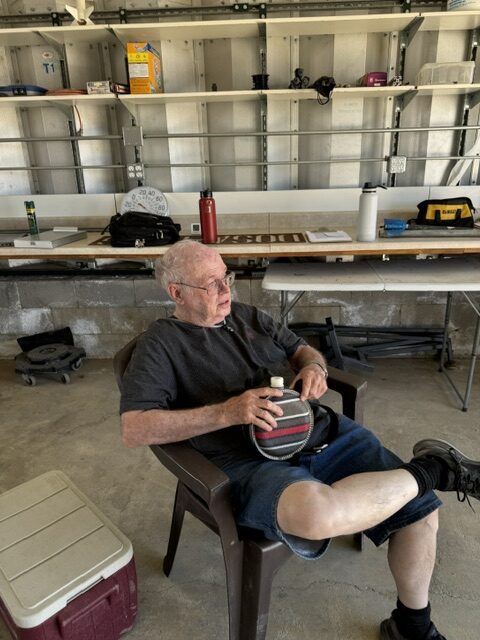
The RRS has a couple 60-foot launch rails under construction for liquid rockets and we’re expanding our static fire, rocket assembly, and shorter launch rails.
As the MTA operates by appointment only, contact the RRS president for approval and scheduling. The RRS MTA offers a spacious and relaxed environment for those willing to carefully plan and discuss their projects well in advance. RRS members in good standing enjoy the MTA without fee.
president@rrs.org
Next meeting of the RRS will be July 11, 2025. We hope our members will update their progress and return. RRS monthly meetings are always the 2nd Friday of each month at the front office of the Compton/Woodley Airport at 7:30pm. You can also dial into the telecon if you contact the RRS secretary, Xavier Marshall.
secretary@rrs.org
Dave Nordling
Pyro-Op, Class 1, RRS.ORG
818-390-3548


